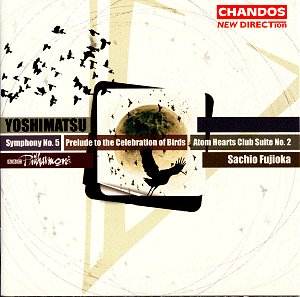I was somewhat perplexed by what I heard on this
disc. I knew very little about the composer, and had certainly
not encountered his music before. In this post-post-modern age,
I suppose I should be prepared for anything, and a substantial
(nearly 47 minutes) work entitled ‘Symphony No.5’, part of a series
called ‘New Directions’ certainly whetted my appetite. I was dismayed
that what I encountered did not fulfil the title ‘symphony’. Far
from appearing to forge any ‘new directions’ most of the music
here is quite old-fashioned and not terribly memorable.
The basic problem in the symphony, at least to
my ears, is that there is simply not enough material of real melodic,
harmonic or rhythmic interest to sustain its length. The brooding
introduction, with its homage to the opening of Beethoven’s 5th,
sets up an expectancy that is not fulfilled. When the main allegro
bursts in around 3’15, we get something akin to the ‘Rumble’
from West Side Story, but without an ounce of Bernstein’s
flair or instrumental expertise. The boogie-woogie piano at 9’32
also sounds a little like passages out of the Age of Anxiety
Symphony, but where the piano there played a central structural
role, here it sounds out of place. The Beethoven motif keeps cropping
up, but I got no sense of real direction from the composer. The
other movements suffer in much the same way, with a rather overblown
finale that sounds like third-rate film music. All the movements
sound like miniature tone poems, atmospheric in places but with
no real link to each other or sense of symphonic purpose. I am
not against tonal music, but the harmonies here are not just unadventurous,
they sound as if they’ve come from doodling around with a few
smoochy blues chords on the piano, then making them the basis
for a large composition. A few composition teachers in a few colleges
would, I reckon, have not let it past the sketch stage.
The Atom Heart’s Club Suite shows us the
composer in even more extreme ‘crossover’ mode, but unlike others
influenced by popular culture, rock and jazz (Steve Martland and
Mark Turnage spring to mind) this sounds terribly contrived and,
I have to admit, faintly embarrassing. Hearing the posh strings
of the BBC Phil trying their level best to boogie just doesn’t
do it for me.
I hoped for a more natural compositional voice
to emerge in the Prelude to the Celebration of Birds,
maybe even some of Yoshimatsu’s own heritage (Takemitsu?). Again,
despite some occasionally exotic percussion and the token bird-like
woodwind effects, all I felt I got was a John Williams-style chunk
of mood music (complete with Walton-esque fanfare); the sort of
thing a good third year student could knock out quite easily.
I gather the composer is quite prolific, and
maybe that’s the problem. He should take a leaf out of Sibelius’s
book and be more self critical, with perhaps a ‘less is more’
attitude. He is obviously a competent orchestrator, but is it
possible that having such high profile backing from a conductor,
orchestra and major record label is dulling his critical responses?
I can’t help thinking of composers out there who have far more
original voices and are struggling to find any recognition. Recording
quality is well up to house standards, but I doubt I shall be
returning to it terribly often.
Tony Haywood
